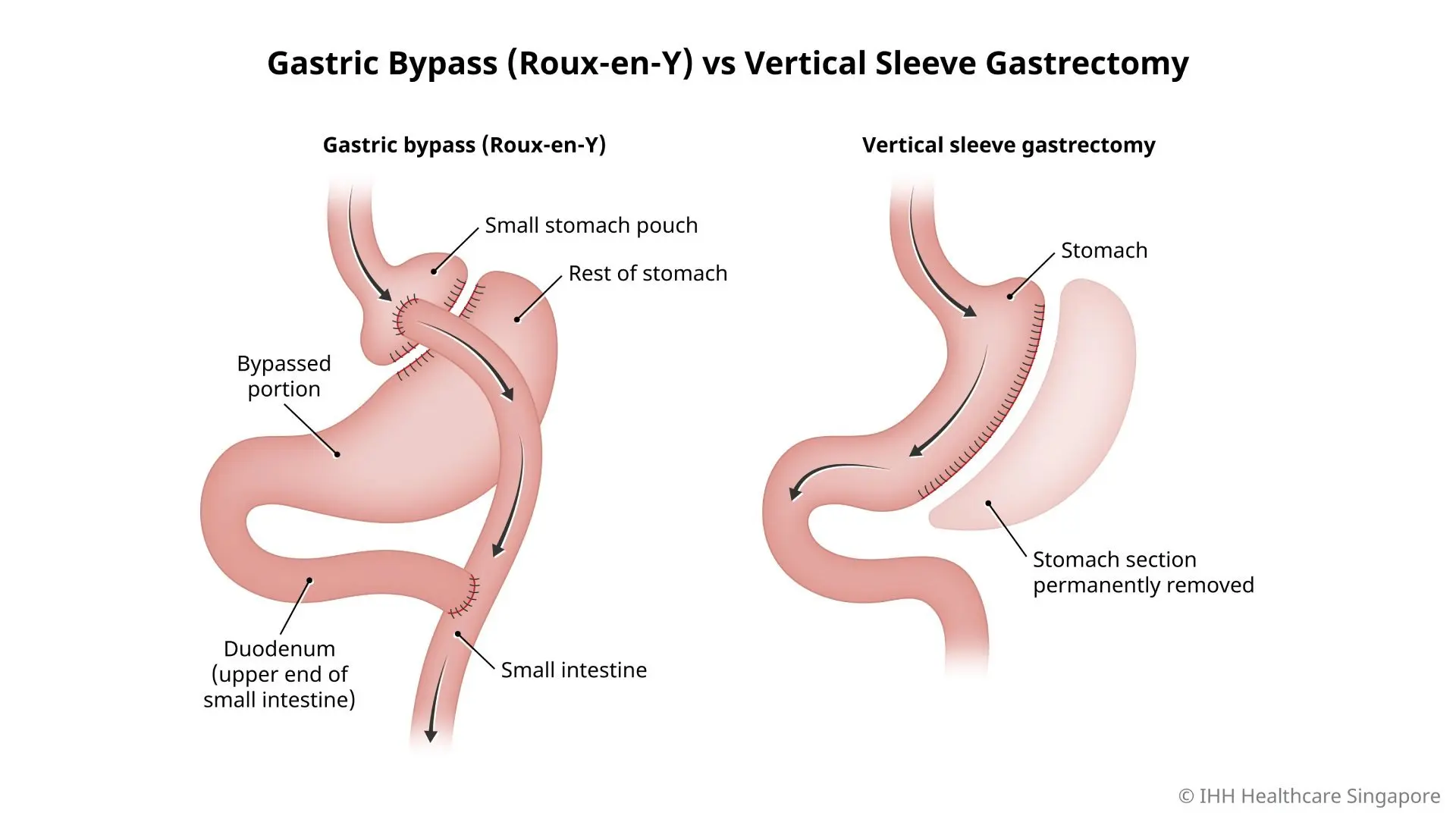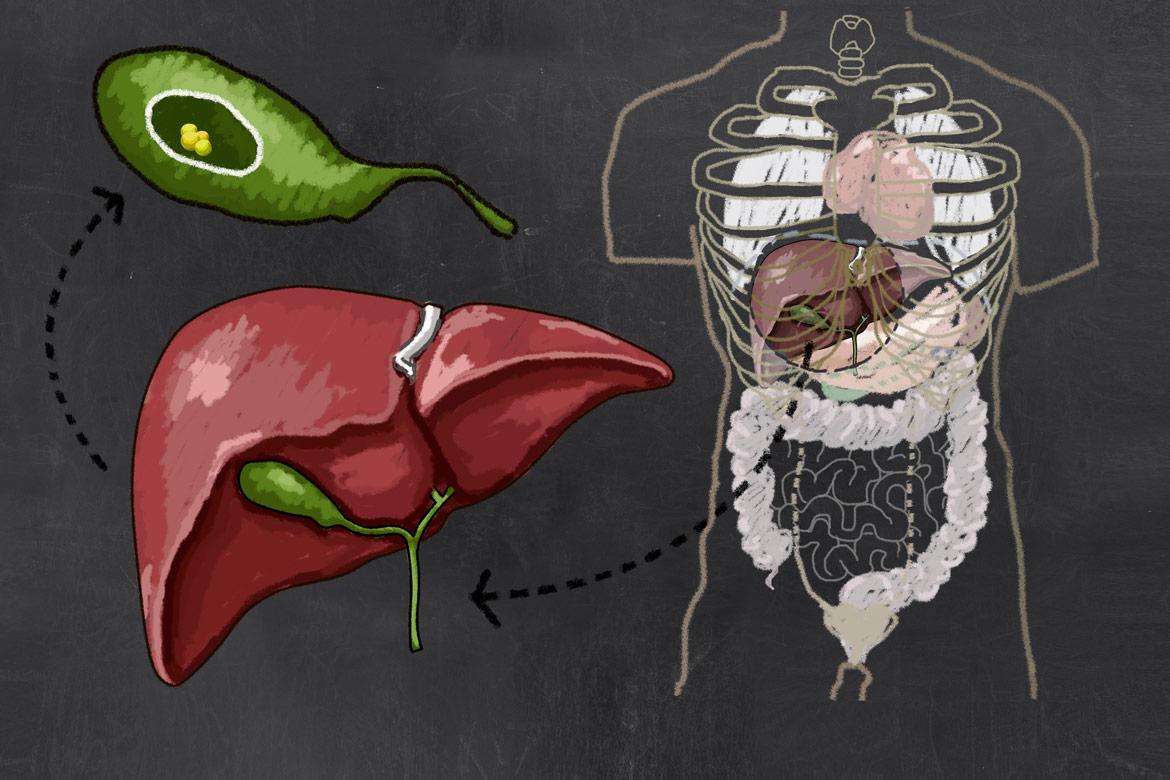What is a gastric bypass (Roux-en-Y)?
Gastric bypass is also known as Roux-en-Y Gastric Bypass (RYGB) – pronounced "roo-en-why". It is a type of weight loss surgery that reduces the size of your stomach to a small pouch by clipping off a section of it.
This small pouch is directly attached to the small intestine, bypassing the rest of the stomach and the upper end of the small intestine. This surgery not only reduces food intake but also limits the absorption of calories and fats by the body.
Gastric bypass is a surgical intervention for obesity. It is done when diet and exercise are not effective or when your weight causes serious health problems. Although difficult, a gastric bypass procedure can be reversed.
Differences between Roux-en-Y and vertical sleeve gastrectomy

Vertical sleeve gastrectomy is another type of bariatric surgery that permanently reduces the size of your stomach to limit your food intake. The table below highlights the key differences between these procedures:
| Gastric bypass (Roux-en-Y) |
Vertical sleeve gastrectomy |
| Part of the stomach is clipped off so a small pouch remains. |
Part of the stomach is permanently removed, leaving a small tube-shaped pouch that is directly connected to the small intestine. |
| This new stomach pouch is attached to a section of the small intestine, bypassing the rest of the stomach and the first part of the small intestine. |
No other changes are made to the digestive system. |
Your doctor will advise the best course of treatment for you, depending on your current health and condition.
Why do you need a gastric bypass?
Gastric bypass is known to produce:
- 60% – 80% excess weight loss in the short term.
- More than 50% excess weight loss in the long term.
- Weight loss within a shorter time frame compared with other surgical procedures.
- Clear resolution of obesity-related health problems.
In general, all types of bariatric surgery including gastric bypass can successfully manage your weight and greatly improve obesity-associated disorders, such as:
To qualify for gastric bypass, your body mass index (BMI) must be:
- More than 32.5, and you must have an obesity-associated disorder such as Type 2 diabetes.
- More than 37.5.
Gastric bypass surgery can help you to enjoy a better quality of life and a longer lifespan. It can also help to prevent future health problems. However, you must be willing to make lifelong lifestyle changes to benefit from weight loss surgery.
Who should not undergo a gastric bypass?
A gastric bypass may not be suitable for everyone who is severely overweight. You need to meet certain medical requirements to qualify for weight-loss surgery. Your doctor will determine whether:
- You are a suitable candidate.
- Gastric bypass is the best type of weight loss surgery for you.
When compared to other types of weight loss surgery, gastric bypass carries the following disadvantages:
- Longer recovery period.
- Slightly higher risk of complications, which can be avoided with proper care.
- Intestinal bypass results in lower absorption of nutrients and vitamins, which can lead to deficiencies particularly in vitamin B12, iron, calcium and folate. You will need to take vitamins for life.
- Higher risk of dumping syndrome, which causes diarrhoea, nausea and vomiting.
What are the risks and complications of a gastric bypass?
Weight loss surgery is considered safe in general. There are some inherent risks as with all major surgery, such as:
- Infection
- Excessive bleeding
- Adverse reactions to anaesthesia
- Blood clots and deep vein thrombosis
- Intestinal leaks in staple line or joints
- Lung or breathing problems
Specifically, risks and complications related to gastric bypass include:
- Higher risk of nutritional deficiencies.
- Increased sensitivity to alcohol.
- Stomach ulcers.
- Bowel obstruction, which is when your small or large intestine gets blocked and prevents fluids and digested food from passing through. Food, fluids, gastric acids and gas can build up behind the blockage and potentially cause your intestine to rupture.
- Stomach perforation, which is when a hole forms all the way through your stomach, large bowel, or small intestine.
How do you prepare for a gastric bypass?
Once your doctor has cleared you for gastric bypass surgery, they will give you instructions how to prepare yourself for the procedure.
You may be asked to:
- Undergo blood tests, X-rays, scans and physical examinations
- Observe diet restrictions on certain foods and drinks
- Stop certain medications
- Start an exercise regime
- Quit smoking
You may also have to plan ahead for your post-surgery recovery by arranging for help at home, if necessary.
What can you expect in a gastric bypass?
Gastric bypass surgery requires a high level of preparation to ensure a safe and successful surgery.
Estimated duration
Gastric bypass surgery usually lasts a couple of hours.
Before the procedure
As gastric bypass surgery involves your stomach, your diet in the days leading to the procedure is especially important.
Starting from 2 days before surgery, you will begin a clear liquid diet to prepare your digestive tract for surgery. This ensures that your stomach and intestines are mostly empty and that you remain hydrated.
Clear liquid food and drink options include:
- Water
- Broth
- Iced tea
- Sports drinks
- Sugar-free drinks
- Strained soups with no solids
- Protein drinks, but please check with your doctor first
You must refrain from all sugary, fatty and alcoholic food and beverages.
Around noon on the day before surgery, you will consume laxatives to clear your bowel.
From midnight before the surgery, you must fast from all foods and drinks. You must also avoid swallowing water while brushing your teeth and rinsing.
During the procedure
You will be given general anaesthesia before your surgery begins.
In most cases, a gastric bypass will be done using a laparoscope. This is a small, tubular instrument with a camera attached. Your surgeon will make small incisions in your abdomen and insert the laparoscope to navigate and perform the procedure on your stomach. If laparoscopic surgery is not possible, your doctor will perform an open surgery by making a larger incision across your abdomen.
After making incisions to access your stomach, your surgeon will cut off the top of your stomach and seal it from the rest of your stomach. The resulting pouch is about the size of an egg. It can only hold about 28 grams of food, compared to 470 grams that a stomach can normally hold.
Next, your surgeon will divide your small intestine. The bottom end will be brought up and connected to the newly created pouch. Food that goes into the pouch will move directly into the small intestine sewn to it.
Then the top portion of the small intestine will be connected to the bottom portion so that stomach acids and digestive enzymes from the bypassed stomach and top portion of your small intestine will eventually mix with the food that you eat.
After the procedure
You will be transferred to a recovery room, where you will be closely monitored. Depending on the procedure, you may need to stay for a few days in the hospital.
You will not be allowed to eat for 1 - 2 days to allow your stomach and digestive system to heal. You will be on a water-only diet.
You will likely spend at least 2 days in the hospital before you have recovered enough to go home. If you develop complications after the surgery, you may need to stay for longer.
Care and recovery after a gastric bypass
There will be many restrictions on how much and what you can eat and drink. In the first 3 – 6 months after surgery, you may experience the following side effects due to rapid weight loss:
- Dry skin
- Body aches
- Feeling cold easily
- Mood changes
- Hair thinning
- Lethargy
You can expect to lose weight rapidly – up to 2/3 of your body weight – for the first 1.5 years.
Food and nutrition
You will be on a liquid or soft food diet in the weeks after the surgery. During this period, you will feel full very quickly, likely after 2 tablespoons of food. Over time, you will gradually progress to a normal, balanced diet which you need to follow permanently.
As you recover, you are advised to:
- Eat slowly and chew carefully.
- Only eat small amounts at a time.
- Avoid foods that can block your stomach, such as soft white bread.
- Take vitamin and mineral supplements to avoid nutritional deficiencies.
Exercise
Once you have recovered from your surgery, you need to start an exercise plan and maintain it for life. The aim is to help you lose as much weight as possible after the operation. Adopt moderate to vigorous physical activities to keep your heart rate up and burn fats, such as:
- Brisk walking
- Gardening or housework
- Swimming
- Cycling
Regular follow-up appointments
For the first 2 years, you will be asked to attend regular follow-up appointments to monitor your health. After that, a check-up with a general practitioner once a year should suffice.
During your follow-up appointments, your doctor may recommend:
- Blood tests to check your vitamin and mineral levels
- Changes to your diet and exercise
- A physical health check
Pregnancy and contraception
Women are generally advised to avoid pregnancy in the first 12 to 18 months after bariatric surgery. Weight loss surgery can negatively affect your vitamin and mineral levels and harm your baby.
You are advised to:
- Use contraception until your doctor advises that it is safe to become pregnant. Check with your doctor about the best type of contraceptives, as not all are suitable for women post-bariatric surgery.
- Speak to your doctor if you become pregnant within 12-18 months after surgery. They can help to check your vitamin and mineral levels and recommend supplements to take.











